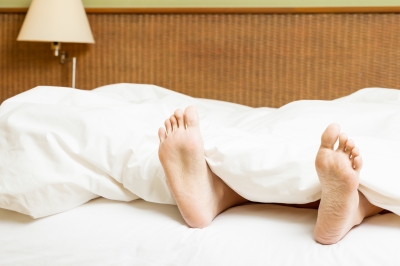
Why Sleep Is Important For Your Body

The following tips on the importance of sleep were provided by Real Sleep by Real Simple, a new Bed in a Box Mattress Brand.
Sleep plays a pivotal role in your health and wellness. While everyone is bound to experience bouts of sleep deprivation here and there, creating a habit of not sleeping can do detrimental damage to your body. We’ve all pulled an all-nighter to cram for a mid-term exam or meet a deadline set by our bosses, but it takes less than 24 hours to start seeing the adverse affects.
The Foundation of Good Health
Terry Cralle, a certified clinical sleep educator in Fairfax, Virginia states, “sleep, along with diet and exercise, constitutes the very foundation of good health.” We know that exercise is important to keep our heart in good shape, fight weight gain, and reduce the risk of developing varying diseases.
We also know that eating healthy is important for the same reasons, but why is sleeping important? Sleep too plays a role in decreasing the risk of developing chronic conditions of diseases. It also has a significant impact on your mental health and overall mood.
The recommended amount of sleep per night ranges from 7-9 hours. Every individual person responds to sleep differently, but when you find that sweet spot, it’s important to make sure they’re all quality hours of sleep. Lacking proper amounts sleep puts you at a greater risk for obesity, diabetes, heart disease, and even increases your risk of having a stroke.
During sleep, your body produces hormones that help you feel full so that you don’t over eat and also produce Human Growth Hormone, which aids in cell regenerate and repair, causing overall bodily development.
Lacking sleep also causes your body to secrete higher levels of cortisol, the stress hormone. Many times, sleep deprivation can be linked depression, suicide, and gloomy feelings.
How Lack of Sleep Affects You
It’s highly recommended that you don’t try to stay awake for long periods of time, but studies have been conducted to show what happens to your body if you do. According to Everyday Health, staying awake for 24 hours straight is the equivalent of a 0.10 percent blood alcohol level (relative to cognitive impairment). Your judgment is compromised; your ability to pay attention decreases, and even your hearing is affected. This is why you feel pretty lousy after pulling an all-nighter.
After 36 hours of being awake, the mental fog is the least of your worries. Your hormones begin to rage and inflammation within your body starts. At this stage, you’re actively increasing your risk of developing high blood pressure or a heart condition. You may even begin to black out a bit, forgetting large chunks of time.
48 hours of being awake can get really dangerous. At this stage, blackouts (called microsleeps) become more severe and happen more often. They’re usually paired with disorientation and clumsiness. Even prior to this stage you shouldn’t drive a car, but after 48 hours of being awake, you shouldn’t operate any sort of machinery at all.
72 hours without sleep is when full on hallucinations kick in. Your brain nearly shuts itself down. Your mental wellbeing is at risk and you would lose the ability to perform even the most basic of tasks. Your body slows itself down as a warning sign to you that you need to hit the hay. Letting it get to this point is far beyond a naturally occurring “sleepless night here and there”.
Sleep Adds to Healthy Lifestyle
If you wish to live an overall healthy lifestyle, getting enough sleep will play a major part in it. Losing just 1-2 hours of sleep per night over time is enough to do some long-term damage.
Sleeping gives your body time to heal damaged cells, recover from a day’s activities, and reboot your heart and cardiovascular system. Sleep is also important for fighting germs as it helps maintains a healthy immune system.






















Comments (2)
Jai
April 3, 2018 at 7:24 pm
Great post. I can speak from experience on this one. A long career in emergency services does not lend well to good sleeping habits. As the years passed by, my sleep began to get more and more interrupted and my ability to fall back to sleep became less and less likely. As that built up, my mental health started to deteriorate – symptoms ranging from loss of memory, severe mood swings, digestive issues, weight fluctuations, and many others. At one point my physician suggested antidepressants to offset some of the physical and mental symptoms because quitting my job was not an option. Doing that only made things worse for me. That’s when I discovered running and vigorous physical exercise as a way to manage. Sleep is everything. So is exercise but if you aren’t sleeping – the rest of your health will suffer. Great post.
COMtnMom
April 3, 2018 at 11:09 pm
That’s really scary! My hat is off to people who work/live with sporadic sleep schedules, due to work. I’m so glad you found something that helps.
Thanks for sharing, Jai 🙂